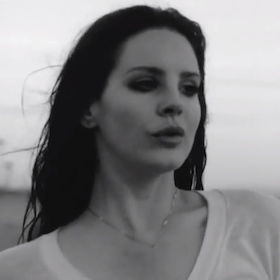Lana Del Rey 'Ultraviolence' Review: Lana Del Rey Finds Her Focus

4/5
Lana Del Rey’s newest album Ultraviolence makes a heavy landing. It’s an avalanche of emotion, which grounds it into one style that finally gives the misguided artist an identity in the music scene.
Del Rey seems to be taking things a bit more slowly this time around, which is a very welcomed change. Her last album, Born to Die, was a literal mess; it tried to wear too many hats, a cornucopia of styles. There was no clear identity to her musicianship, which made the album a flat-out jarring experience.
But this new album seems to pick a particular style and sticks with it. It’s a lot slower and less pop-like than Born to Die. Maybe it’s a little too moody for most people’s taste, but there’s no doubt the album will successfully leave you with a brooding sense of loneliness, no matter what you’re into. Ultraviolence is brimming with emotion and the music simply sounds beautiful. “Brooklyn Baby” takes the cake for creating a gorgeous, theatrical atmosphere. (It also earns brownie points for referencing Lou Reed-my favorite glam rock artist of all time.)
The one aspect of the album I found a smidge annoying was the names for some of the songs. They can be cringe inducing and cheesy. Same goes for a few of the songs in Born to Die, such as the unforgettable “Diet Mountain Dew.” But to Ultraviolence’s credit, the songs are a lot less obnoxious. “Shades of Cool” may have a silly name, but there’s a dark side in there. Del Rey’s voice glazes over dark undertones that come from the seemingly innocent lyrics: “He lives for love, he loves his drugs/ He loves his baby too.” It’s heartbreaking one moment, and ridiculous the next.
This shift happens in the rest of the album as well. For example, “West Coast” starts at a faster tempo and then suddenly slows down as it transitions into a completely different song, symbolizing Del Rey’s rebellious nature against conformity and her appreciation for the unique.
Things go a bit south by the second half of the album. The character Del Rey is exploring spends too much time under a single light: songs about drugs, masochism and self-hatred get real old, real fast. The melodies get less interesting too; you may even forget your music player went on to the next song.
Regardless, it’s a relief to know that Lana Del Rey is finally defining herself as an artist by sticking to a particular style in Ultraviolence. Beautiful yet sad, the album has interesting musical set pieces, but it struggles by sticking to a single angle of Del Rey’s new dramatic persona, making the entire experience less interesting.
RELATED ARTICLES
Get the most-revealing celebrity conversations with the uInterview podcast!







Leave a comment